Use our "special collections" to find pre-tagged groupings of cases we think might be of particular interest. Or the case type page offers broader categorizations. You can also create your own groupings using issue and other search terms, from the home/search page.
Special Collections
This collection includes cases brought by individuals, organizations, states, municipalities, and other entities against the second Trump administration. Cases in this collection deal with a broad range of civil rights issues, including but not limited to immigration, LGBTQ+ rights, reproductive rights, freedom of speech and the media, and administrative law. Click here for cases brought by the Trump Administration, click here for cases otherwise involving the Trump Administration, and click here for cases in which the Administration has reversed course.

This collection includes litigation and DOJ investigations brought by the second Trump administration. Cases in this collection deal with a broad range of civil rights issues, including but not limited to immigration, LGBTQ+ rights, reproductive rights, and freedom of speech and the media. Click here for cases brought against the Trump Administration, click here for cases otherwise involving the Trump Administration, and click here for cases in which the Administration has reversed course.
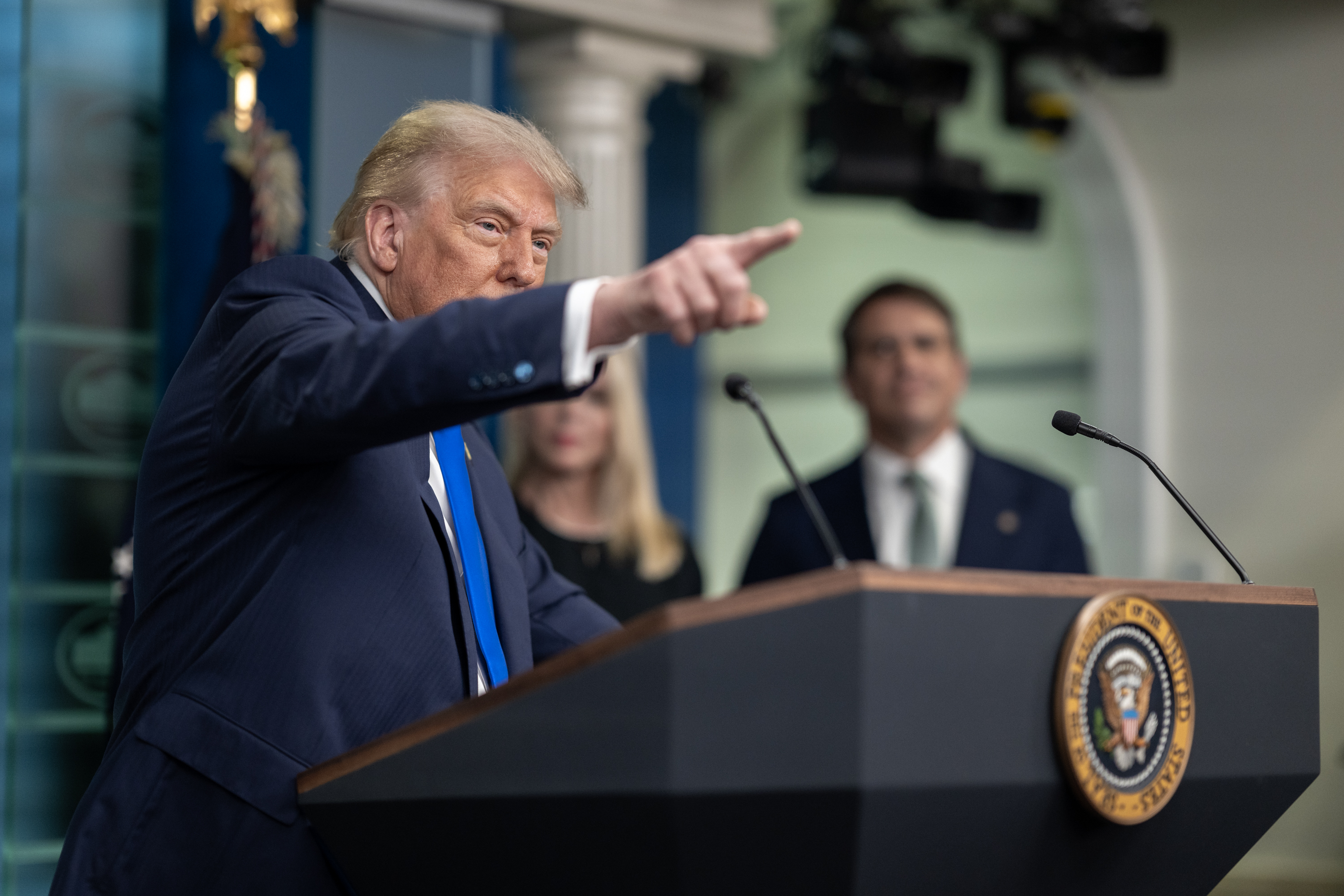
The White House
This collection includes litigation and DOJ investigations brought by, or otherwise involving, the second Trump administration. Cases in this collection deal with a broad range of civil rights issues, including but not limited to immigration, LGBTQ+ rights, reproductive rights, and freedom of speech and the media. Click here for cases brought against the Trump Administration, here for cases brought by the second Trump Administration, and here for cases in which the Administration has reversed course.

Gage Skidmore
This collection includes matters in which the second Trump administration has reversed course, such as voluntarily dismissing lawsuits initiated by previous administrations, ending investigations, settling lawsuits previously defended, or seeking to terminate existing settlement agreements. Cases in this collection deal with a broad range of civil rights issues, including but not limited to policing, school desegregation, environmental justice, immigration, LGBTQ+ rights, reproductive rights, and administrative law. Click here for cases otherwise by or involving the Trump Administration, and click here for cases brought against the Trump Administration.
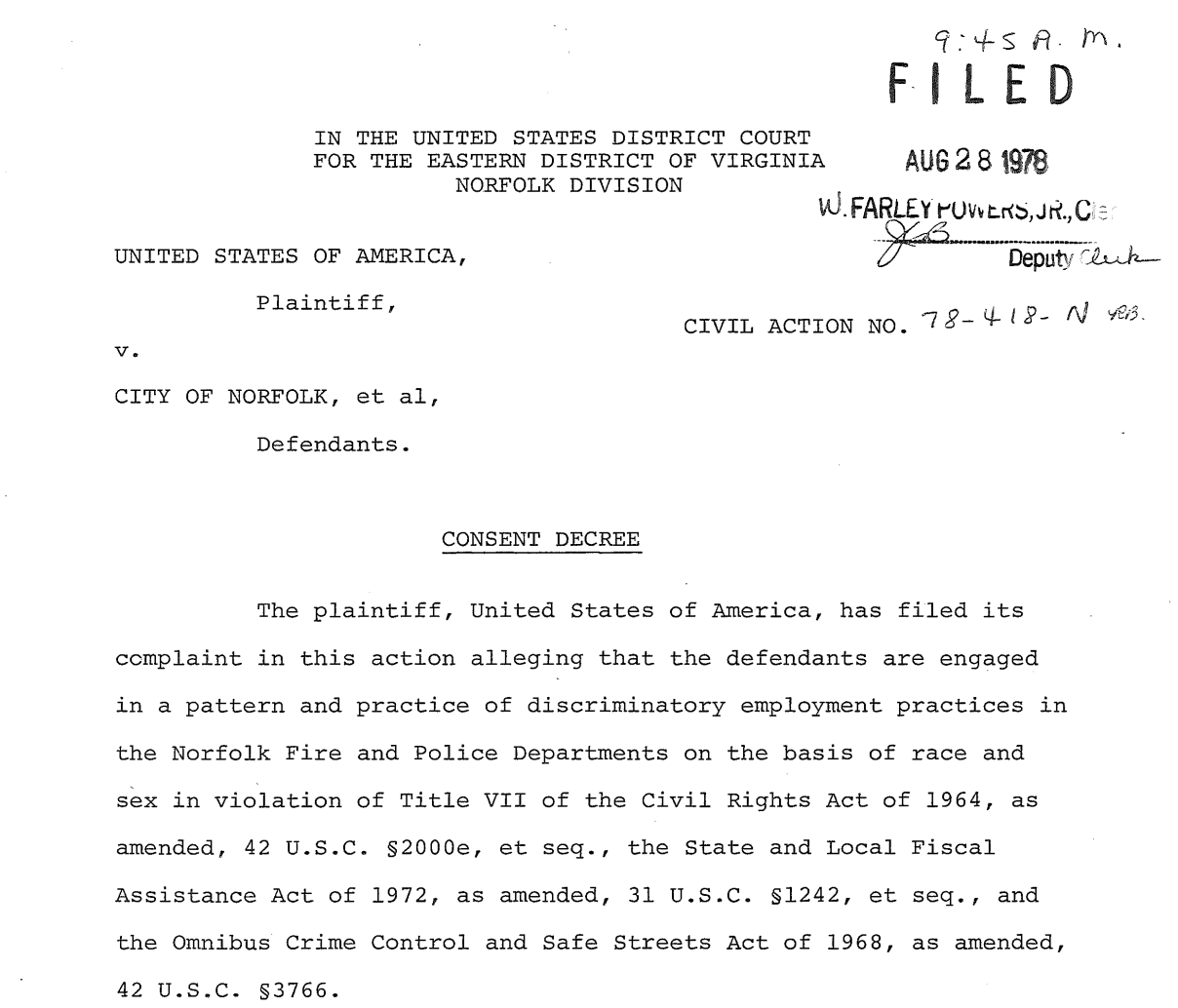
In 1973, the U.S. Supreme Court held in Roe v. Wade that there was a fundamental right to abortion under the U.S. Constitution, limiting states' ability to restrict access. Beginning in 1975, some state legislatures passed trigger ban laws, that is, laws that would go into effect to ban or significantly curtail abortion in the state if, and as soon as, Roe was overturned. On June 24, 2022, the Supreme Court overturned Roe in Dobbs v. Jackson Women's Health Organization, and several state trigger bans went into effect. Reproductive justice advocates have since filed several lawsuits, primarily in state courts, challenging the trigger ban laws. Those legal challenges to the abortion trigger ban laws are the focus of this collection.

Laurie Shaull, Flickr
In September of 1971, incarcerated people in New York's Attica Correctional Facility took control of the prison and took several staff members hostage. The uprising ended when state police violently stormed the prison, killing thirty nine incarcerated people and staff members. Attica was one of the most significant events in the American prisoners' rights movement and drew public attention to poor conditions in prisons across the country. The uprising, retaking, and their aftermaths spawned numerous lawsuits, many of which are included in this special collection.

NYS Archives
On August 24, 2022, President Biden announced his student loan forgiveness plan: to provide up to $20,000 of debt relief to Pell Grant recipients with federal loans and up to $10,000 to non-Pell Grant recipients, provided those in either category made less than $125,000 in income during 2020 or 2021. This special collection comprises cases challenging the plan.

Joe Flood, Flickr
This collection consists of jail conditions cases in California that all at some point included an order that functioned as a population cap. For more about how these cases fit into the legal and political ecosystem around changes enabled by prison population reduction, see Margo Schlanger, Plata v. Brown and Realignment: Jails, Prisons, Courts, and Politics, 48 Harv. C.R.C.L. L. Rev. 165 (2013).

These cases are described in an article about how California's very large bar with a critical mass of expert prisoners' rights lawyers has enabled prisoners' rights litigation in California to be uniquely influential: Margo Schlanger, The Just-Barely-Sustainable California Prisoners' Rights Ecosystem, 664 Annals of the American Academy of Political and Social Science 62 (2015).

This collection consists of cases litigated by the U.S. Department of Justice Civil Rights Division from the 1960s through the 1990s, including cases brought under the Civil Rights of Institutionalized Persons Act (CRIPA). This special collection was made possible with the generous assistance of a number of lawyers who previously worked for the Division, the Civil Rights Division Association (a non-profit group of Division alumni and current staff), and the Division's Special Litigation Section.

This collection brings together lawsuits challenging the Affordable Care Act's requirement that birth control be part of health insurance for employees. These challenges come from over a hundred Catholic organizations and other religious groups, and many were impacted by the Supreme Court’s decision in Burwell v. Hobby Lobby.

Only rarely is receivership used in civil rights cases—although as this collection demonstrates, receivership is a less uncommon remedial device in cases dealing with public housing and cases in the District of Columbia. Still, receiverships are not unheard of in other areas; the collection includes, for example, high-profile receiverships in Plata v. Brown (California prison medical care), and in Allen v. City of Oakland (Oakland police department).
These cases address the challenges posed by the COVID-19 pandemic over a wide range of areas, such as COVID-19 protections (e.g. social distancing, vaccine requirements, releases) in jails, prisons, and immigration detention centers; distribution of funds from the CARES Act; voting rights; and restrictions imposed by lockdown orders.

Section 702 of FISA permits foreign intelligence surveillance targeting the communications of non-U.S. persons located abroad. This collection contains criminal cases in which the government notified the court that FISA surveillance was relevant to the case, and the defendant then challenged the lawfulness of that surveillance or the evidence obtained.
This collection gathers cases addressing the needs of incarcerated people who are deaf/hard-of-hearing or blind/low vision. It accompanies a Clearinghouse white paper that uses these cases to compile suggested practices for jail/prison facilities.

photo by Peter Merts, courtesy of Arts in Corrections
In civil rights cases on issues of broad public concern, the U.S. Department of Justice Civil Rights Division sometimes files a "statement of interest." This is usually a document that takes no position on the facts of the case, but provides the court with a recommended framework to assess the plaintiffs' claim. These statements are important policy documents, establishing the DOJ position on highly contested topics.

The Equal Employment Opportunity Commission (EEOC) is the federal agency charged with enforcing laws against discrimination in the workplace, and a significant part of its work involves filing federal lawsuits. The EEOC Litigation Project involved a systematic study of the litigation activities of the EEOC and the agency's outcomes over a 10 year period of time.

This collection gathers a number of civil rights cases of great historical significance for which the Clearinghouse has made a special effort to include a larger-than-typical portion of the documents, and to summarize with a bit more historical context. It includes, for example,
- Early school desegregation cases, including Brown v. Board of Education, Milliken v. Bradley (Detroit), Liddell v. Board of Educ. of St. Louis
- The earliest (and longest lasting) public housing discrimination case, Gautreaux v. Chicago Housing Authority/Gautreaux v. Hills
- The first educational sexual harassment case, Alexander v. Yale
- A 1970s housing discrimination lawsuit against the Trumps, United States v. Fred C. Trump, Donald Trump, and Trump Management, Inc.
- Among the very first prisoners rights trials, Jordan v. Fitzharris
- Early employment discrimination class actions, including U.S. v. IBEW, #38 (against a union), and EEOC, Hodgson, and U.S. v. AT&T (sex discrimination)

Liddell v. Bd. of Ed. of St. Louis, Docket (1972)
This collection features lawsuits challenging the practice of jailing poor people who cannot afford to pay bail, fines, or fees. This wealth-based detention takes a variety of forms, and advocates argue that these practices effectively amount to jailing those too poor to pay for their freedom.

In April 2014, the city of Flint, Michigan, changed its water source, but failed to apply corrosion inhibitors to the water. As a result, lead from aging pipes leached into the water supply, leading to extremely elevated lead levels. A great deal of complex federal and state court civil litigation followed. This special collection includes the class actions and consolidated matters. (The Clearinghouse does not cover the many criminal cases filed against local and state officials in regard to the crisis.)

Dschwen
This Clearinghouse special collection brings together all the litigation we know about that deals with the Foreign Intelligence Surveillance Act (including the FISA Amendments Act). Many are newly declassified items from the docket of the Foreign Intelligence Surveillance Court (FISC); others predate those recent disclosures.

Section 702 of FISA permits foreign intelligence surveillance targeting the communications of non-U.S. persons located abroad without needing to establish probable cause. Communications of U.S. citizens and residents are frequently collected "incidentally" if those U.S. persons are communicating with a targeted foreigner. This Clearinghouse special collection brings together litigation addressing this part of FISA.

This category brings together litigation addressing the NSA collection of U.S. email metadata that began in 2001. In 2004, the Attorney General sought and obtained judicial ratification of the internet metadata program under Section 402 of FISA, commonly referred to as the Pen Register and Trap and Trace (PR/TT) provision or Section 214 of the USA PATRIOT Act. These records included the "to," "from," "cc," and "bcc" lines of an email and the email's time and date. The Obama administration discontinued the program in 2011.

The National Security Agency's (NSA) so-called "Bulk Telephony Metadata Program" proceeds under Section 501 of FISA, commonly referred to as Section 215 of the USA PATRIOT Act. Under the program, the NSA has apparently collected records from large telecommunication companies about virtually all domestic telephone calls. These records, termed "telephony metadata," include the phone numbers placed and received; the date, time and duration of calls; some location identifiers; and calling card numbers. The records, however, allegedly do not include the parties' names, addresses or financial information or the call's content. This special collection brings together all cases addressing this program, mostly in the Foreign Intelligence Surveillance Court, but some elsewhere.

The FISA Court (FISC) was established by the Foreign Intelligence Surveillance Act of 1978 (FISA) to oversee government requests for foreign intelligence surveillance warrants by federal law enforcement agencies. Before the Edward Snowden disclosures in 2013, the opinions and pleadings from the FISC were nearly all classified, but many are now available in scattered locations. This Clearinghouse special collection brings these documents together in one place.

For the 2020 election, the Stanford-MIT Healthy Elections Project compiled a database tracking election law cases arising out of the COVID-19 pandemic—over 400 cases in more than 44 states. For more information on the project, see https://healthyelections.org.

This collection gathers cases addressing Hepatitis C testing and treatment in jails and prisons, with particular focus on litigation seeking widespread provision of direct acting antiviral treatment.

istock.com/mindfulmedia
This special collection focuses on challenges to labor practices at immigrant detention centers across the country. Persons currently or formerly held in civil immigration detention centers sued either GEO Group or Core Civic, two private companies that operate prisons and detention centers.

The Institute for Women's Policy Research (IWPR), in collaboration with The WAGE Project, Inc., examined consent decree remedies for sex and race discrimination in the workplace. The research focused on the design and impact of organizational remedies on changing workplace conditions, looking at approximately 500 consent decrees that went into effect between 2000 and 2008. Researchers also made in-depth studies of a small number of highly innovative consent decrees in order to better describe best practice for using consent decrees to improve working conditions through the eradication of discrimination based on race and sex from the workplace.

This collection includes cases challenging parole processes and procedures for people incarcerated for crimes committed as youth.

Flickr.com; circulating.
In the spring and summer of 2020, the Trump administration mobilized many federal law enforcement agents against protesters in Washington, D.C., Portland, Chicago and other cities. This special collection contains lawsuits against Federal Protective Service, ICE, CBP, Park Police, and other officers accused of acting outside their statutory authority, retaliating against people exercising free speech rights, arresting individuals without probable cause, and using excessive force.

@Clypian
This collection covers a series of important prison litigation cases filed in New York federal courts by American prisoners' rights movement activist Martin Sostre.

Pittore44 / CC BY-SA
In joint work with the Allen Institute for AI, the Clearinghouse has contributed metadata and summaries for about 4500 federal cases to a new machine learning dataset, in an effort to train and refine Natural Language Processing (NLP) models that can generate automated summaries. You can read about the project in its first paper: Shen, Lo, Yu, Dahlberg, Schlanger & Downey, Multi-LexSum: Real-world Summaries of Civil Rights Lawsuits at Multiple Granularities, currently posted here. This special collection tags the in-sample cases.

This special collection is actually hosted outside the Clearinghouse. It brings together policy documents on selected topics, focused on prison and jail policies, mostly gathered via Freedom of Information Act requests. To access the collection, click here.

Occupy Wall Street was a protest movement that began on September 17, 2011, in Zuccotti Park, in New York City's Wall Street financial district. Protests spread across the U.S. in the subsequent days and months. In a number of jurisdictions, litigation resulted from police interaction with Occupy protesters. Some of it is collected here.

(2011)
In its opinion in Olmstead v. L.C., 527 U.S. 581 (1999), the U.S. Supreme Court held that persons unnecessarily confined to institutions for care relating to mental or intellectual disabilities have the right to state-funded community-based treatment options. This decision has led to an entire category of litigation ("Olmstead litigation"); the Clearinghouse has collected these cases here.

Official White House Photo by Pete Souza
This collection includes cases related to Operation Metro Surge, a federal immigration enforcement effort launched in December 2025, through which thousands of federal agents were deployed in Minneapolis and St. Paul, Minnesota.
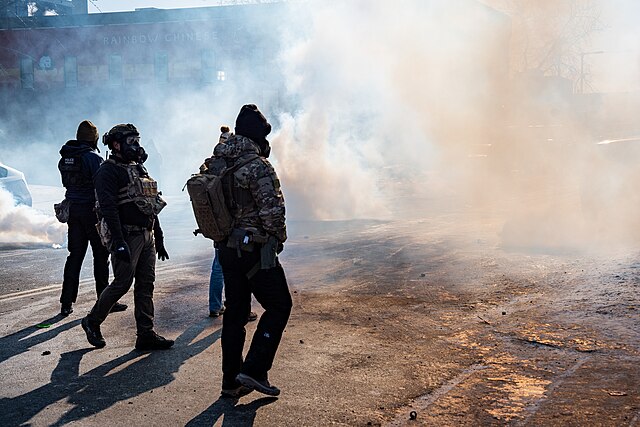
Chad Davis, Wikimedia Commons
A number of states have taken steps to eliminate Planned Parenthood's eligibility for federal Medicaid funding for non-abortion reproductive health care. Even though taxpayer dollars cannot pay for abortions, the states argue that Planned Parenthood's overall programs—which include both abortion and non-abortion services—should make it ineligible for Medicaid for any service it provides. This collection tracks the litigation that has resulted in many states.

Minneapolis police officers killed George Floyd, a 46-year-old Black man, on May 25, 2020. Nationwide protests followed, often under the banner "Black Lives Matter." This special collection brings together relevant litigation regarding city and law enforcement responses to the protests, focusing on group cases and class actions. Lawsuits covered issues including curfews, police use of chemical agents, arrests and assaults of reporters, denials of permits, excessive force and unlawful arrests, racial discrimination against protesters and media, and dispersal of protests.

@Clypian
Under the Prison Litigation Reform Act, 18 U.S.C. § 3626(a)(1)(A)(a), enacted in 1996, federal courts may enter an enforceable decree in prison or jail conditions cases only if the remedy is "narrowly drawn" and "extends no further than necessary." This special collection brings together cases in which the remedies have been ratified under this standard.

Under the Prison Litigation Reform Act, 18 U.S.C. § 3626(a)(1)(A)(a), enacted in 1996, federal courts may enter an enforceable decree in prison or jail conditions cases only if the remedy is "narrowly drawn" and "extends no further than necessary." To avoid application of these constraints, parties can instead settle cases using "private settlement agreements," which may be enforced as contracts. This special collection brings together injunctive (but not damages) cases in which settlements fit this definition.
Prison Legal News is an independent monthly magazine from the Human Rights Defense Center that covers prisoners' rights, court rulings, and news concerning criminal justice issues. It has brought many lawsuits challenging official policies and practices that allegedly interfere with PLN's free speech rights, including the ability to communicate with prisoners, not only for PLN's speech, but for all publishers and others who want to communicate with people who are incarcerated.

The special collection consists of discrimination class action lawsuits brought by private plaintiffs against employers.

This collection brings together cases that sought to legalize same-sex marriage or to invalidate refusals to recognize state-law same-sex marriages. It includes the cases that the U.S. Supreme Court decided in June 2013 and June 2015: Obergefell v. Kasich (OH), Love v. Beshear (KY), Tanco v. Haslam (TN), DeBoer v. Snyder (MI), Perry v. Schwarzenegger (CA) and Windsor v. United States.

© Mirko Ilic Corp.
In the years leading up to the Voting Rights Act, whose passage was a direct response to the famous Selma-to-Montgomery marches in March 1965, civil rights activists tirelessly worked to end voter discrimination. Meanwhile, the U.S. Department of Justice's Civil Rights Division sought to curb racial discrimination in Alabama that kept Black individuals from voting. The cases in this collection include the DOJ complaints about voter discrimination and harassment in Alabama, civil rights activists' complaints against various coercive practices, the injunction allowing protesters to assemble in March 1965, and the DOJ's prosecution of the Klansmen who killed Viola Liuzzo.

The special collection features one of the largest human trafficking cases in U.S. history. In the aftermath of Hurricane Katrina, the Alabama-based marine services company Signal International and its recruiters promised permanent residency and good employment to over 500 Indian men. Instead, the men's H2-B visas were only temporary, and they were forced into racially-segregated labor camps that were overcrowded and unsanitary. The resulting lawsuits, starting with David v. Signal International, are collected here. The litigation resulted in a $14.1 million jury verdict in David, a $5 million settlement in the EEOC case for 476 guestworkers, and an apology from Signal's CEO.

Southern Poverty Law Center
This group of cases addresses solitary and/or supermax confinement in jails, prisons, and other incarcerative institutions.

DOCCS Daily Population Capacity Report, 06/11/12 (NYCLU)
The Stop-Question-and-Frisk program ("stop-and-frisk") in New York City, was a New York Police Department program in which police officers stopped and questioned hundreds of thousands of pedestrians, frisking them for weapons and other contraband. (This kind of stop is referred to as a "Terry stop" after Terry v. Ohio.) The program, and related search programs, were the subject of sustained litigation; the relevant cases are collected here.

Runs with Scissors (2007)
Strip search cases—involving police on the streets, lock-ups, jails, prisons, and juvenile institutions—are spread across different Clearinghouse case categories. This special collection pulls these cases out for ease of use and search. For more information, see Margo Schlanger, Jail Strip-Search Cases: Patterns and Participants, 71 Law & Contemp. Problems 65 (2008).

06-28-06 © Trista Weibel
Title IX of the Educational Amendments Act of 1972 prohibits discrimination on the basis of sex in educational programs and activities. The U.S. Department of Education has conducted many investigations and resolved many cases alleging that sexual violence on college campuses constitutes gender discrimination, unlawful under Title IX. This collection contains some of the cases of greatest interest. A more comprehensive list/set of materials on those cases is available at the Department of Education's FOIA page.

Collection of lawsuits challenging police traffic stops.

Tomas Del Coro, Flickr (2010)
This collection includes cases relating to transgender persons' access to public, multi-occupancy restrooms that match their gender identities. The issue rose to national political significance following conservative state legislators in North Carolina passing a state law that restricted access to multi-occupancy public bathrooms and changing facilities based on the gender on a person's birth certificate. The law was passed on March 23, 2016, in an emergency session of the legislature called in response to a anti-discrimination law in Charlotte, North Carolina. That anti-discrimination law had expanded protections to cover LGBTQ+ individuals and had given transgender persons the right to use bathrooms matching their gender identities. For more, see Understanding HB2: North Carolina's newest law solidifies state's role in defining discrimination.

By AxelBoldt (talk · contribs) (Own work) [Public domain], via Wikimedia Commons
This collection includes cases relating to access to healthcare for transgender people. The collection includes lawsuits seeking access to health insurance and to gender-affirming care, as well as lawsuits challenging discrimination and mistreatment within the healthcare system.

Eric Wagner, Flickr, <a href="https://creativecommons.org/licenses/by-nc-sa/2.0/legalcode">some rights reserved</a>.
In 2017, President Trump issued a series of executive orders relating to immigration and refugee policy and announced his plan to repeal an Obama Administration executive order expanding the Deferred Action for Childhood Arrivals (DACA) program. Legal challenges ensued immediately following each action. This collection consists of challenges to the immigration enforcement orders, including litigation related to sanctuary cities/states, DACA, deportations, and border wall construction. This collection also includes challenges brought in the second Trump administration.

This collection contains Freedom of Information Act (FOIA) litigation, as well as any documents made public from the litigation, pertaining to the Trump administration's policies. In the first Trump Administration, record requests were related to a variety of immigration policies, including new vetting policies, the ban on refugees from certain nations, and border wall projects. In all cases, the plaintiffs argued that the administration failed to release records requested under FOIA.

This collection includes cases brought by individuals, organizations, states, municipalities, and other entities against the first Trump administration. Cases in this collection deal with a broad range of civil rights issues.
This collection contains the principal cases litigating the Travel Ban executive orders installed by the Trump administration shortly after President Trump was inaugurated. Even after President Biden took office and rescinded these executive orders on January 20, 2021, many of these cases remain unresolved as plaintiffs seek remedies from DHS and the State Department for harms suffered as a result of the Travel Ban.
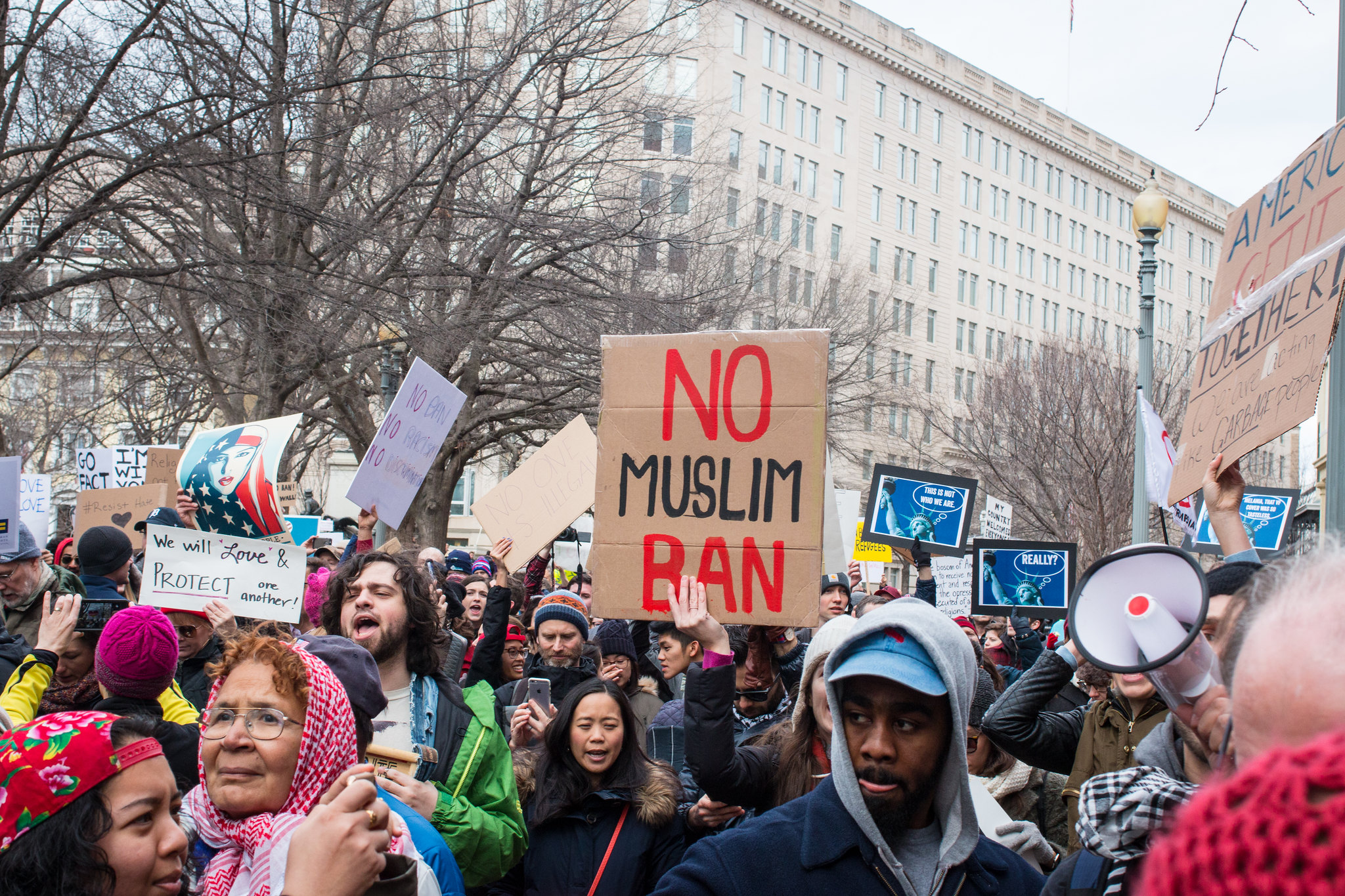
Liz Lemon
This collection consists of cases brought by and against Donald Trump in his personal capacity--before, after, and during his presidencies.
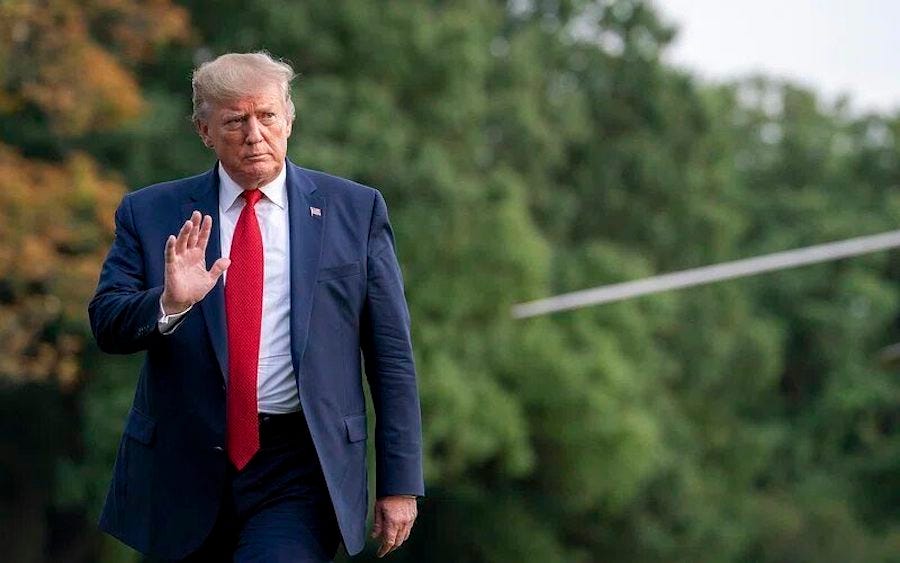
Ken Klippenstein
This collection includes cases brought under Title VI of the Civil Rights Act of 1964 that allege antisemitism or anti-Palestinian/anti-Muslim actions at colleges and universities.
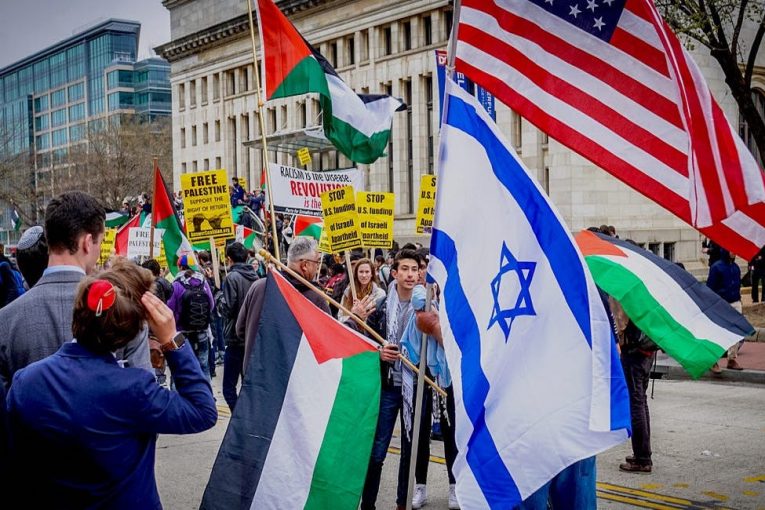
Ted Eytan
This collection includes lawsuits challenging mid-decade redistricting, post-2020, in states across the country.

OutlawRun, <a href="https://creativecommons.org/licenses/by-sa/4.0">CC BY-SA 4.0 </a>, via Wikimedia Commons
This collection includes civil lawsuits against hate groups.
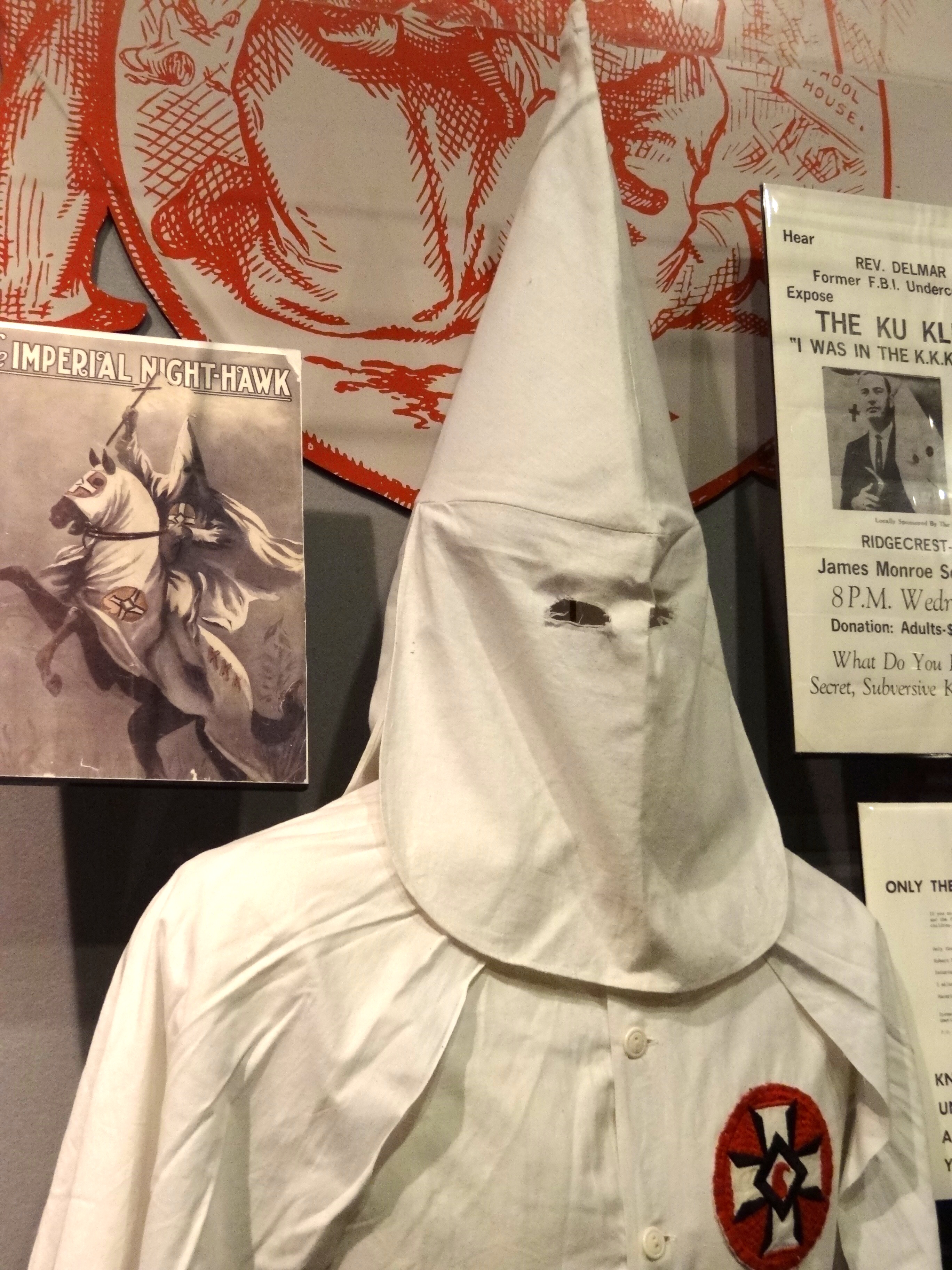
Adam Jones, PhD (2012), via Wikimedia Commons